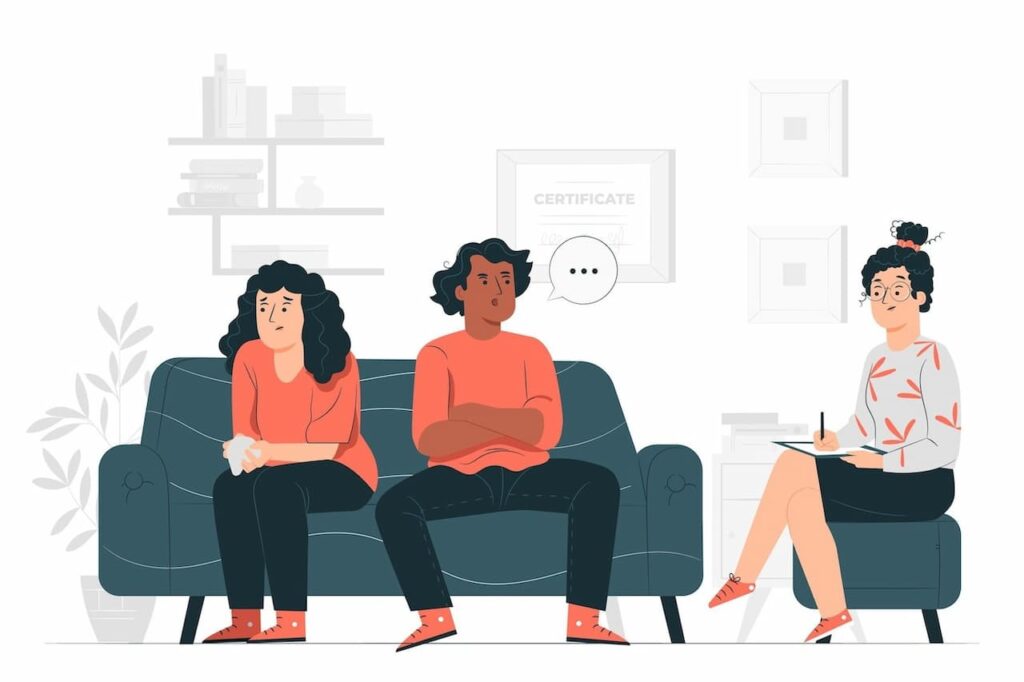Counselling is a type of treatment that tries to assist people in overcoming a range of emotional and personal difficulties. There are various areas of counselling, each with its unique focus and techniques. Through the process of counselling, a professional assists a person in resolving their emotional or mental health problems by determining the underlying reasons of their troubles and giving them the tools to manage and cope with them. There are many counselling specialties that address particular problems. In this article, we will explore some of the most common areas of counselling.
Table of Contents
Toggle
Abuse Counselling
Abuse counselling is a sort of therapy that focuses on supporting those who have endured various types of abuse, including physical, emotional, and sexual abuse. Abuse counsellors engage with clients to help them recover from the trauma of abuse and create coping mechanisms for its aftereffects. Talk therapy, cognitive-behavioral therapy, and trauma-focused therapy are just a few of the strategies that can be employed in this sort of counselling. Counsellors for abuse may also assist clients in creating safety plans and put them in touch with services like support groups and shelters.

Anger Management Counselling
Anger management counselling is a sort of treatment that concentrates on assisting people in managing their anger and creating healthy emotional expressions. Counsellors that specialise in anger management work with their clients to pinpoint the situations that make them angry and create coping mechanisms. Numerous approaches, such as those for relaxation, assertiveness training, and cognitive restructuring, may be used in this kind of counselling. Counsellors that specialise in anger management may also help clients de-stress and develop better communication skills.
Bereavement and Loss Counselling
Bereavement and loss counselling is a sort of therapy that focuses on assisting people in coping with the loss of a loved one. Bereavement and loss counsellors assist clients in processing their loss and creating coping mechanisms for their emotions. Talk therapy, mindfulness, and cognitive-behavioral therapy are just a few of the approaches that may be used in this kind of counselling. Counsellors for bereavement and loss may also assist their clients in finding support networks and other tools to help them deal with their loss.

Depression Counselling
Depression counselling is a sort of treatment that focuses on supporting people who are going through depressive symptoms. Depression therapists collaborate with clients to pinpoint the underlying reasons of their depression and provide coping mechanisms for its symptoms. A variety of counselling methods, such as talk therapy, cognitive-behavioral therapy, and medication management, may be used in this sort of counselling. Counsellors for depression may also encourage their clients to adopt positive dietary and exercise habits to lift their spirits.

Eating Disorders Counselling
The goal of eating disorders counselling is to support those who are battling eating disorders like anorexia, bulimia, and binge eating disorder. Counsellors for eating disorders assist patients in addressing the underlying emotional and psychological problems that underlie their disordered eating patterns. A variety of strategies, such as talk therapy, cognitive-behavioral therapy, and nutritional counselling, may be used in this sort of counselling. Counsellors for eating disorders may also provide clients with coping mechanisms and referrals to support groups and treatment facilities.
Low Self-Esteem and Confidence Counselling
Counselling for low self-esteem and confidence aims to support those who experience self-doubt and feelings of poor self-worth. Counsellors for clients with low self-esteem and confidence help them pinpoint the root causes of their poor self-esteem and devise plans to enhance their self-perception. A variety of counselling methods, such as talk therapy, CBT, and mindfulness, may be used in this sort of counselling. Counsellors for clients with low self-esteem and confidence may also assist them in creating self-care routines and enhancing their communication abilities.
Relationship Counselling
The goal of relationship counselling is to assist both individuals and couples in strengthening their bonds. Relationship therapists collaborate with clients to pinpoint the difficulties that are producing friction in their partnerships and devise plans to enhance communication and fortify them. Talk therapy, cognitive-behavioral therapy, and emotion-focused therapy are just a few of the strategies that can be employed in this kind of counselling. In addition to improving their connection, relationship counsellors may assist clients in learning constructive dispute resolution techniques.

Stress Counselling
Stress counselling is a sort of therapy that focuses on assisting people in managing stress and creating effective coping mechanisms. Counsellors who specialise in stress management help their clients pinpoint the sources of stress in their life and create stress-reduction plans.
Marriage and Family Counselling
Marriage and family counselling is a type of therapy that focuses on assisting families and couples in strengthening their bonds, improving communication, and resolving disputes. Counsellors for marriage and families assist families in resolving problems such parent-child disputes, mixed families, and divorce. Families may benefit from this kind of treatment as they cope with loss, grief, and trauma. To assist families in overcoming their difficulties, counsellors in this field frequently employ a number of treatments such Cognitive Behavioural Therapy (CBT), Solution-Focused Brief Therapy (SFBT), and Emotionally Focused Therapy (EFT).

Career Counselling
The goal of career counselling is to assist clients in selecting and pursuing a career that is satisfying and compatible with their interests and strengths. In order to assist clients choose careers that are a suitable fit, career counsellors work with them to evaluate their talents, values, and aspirations. A variety of procedures, such as career assessments, job search tactics, and resume writing, may be used in this form of counselling. Additionally, career counsellors can assist clients in resolving problems at work, such as confrontations with coworkers or job loss.
Substance Abuse Counselling
Helping people who are battling addiction or substance abuse disorders is the main goal of the therapy known as substance abuse counselling. Counsellors for substance misuse work with clients to determine the underlying causes of their addiction and create management plans for their cravings and triggers. This kind of counselling may use a variety of methods, such as group therapy, cognitive-behavioral therapy, and motivational interviewing. In addition to helping clients establish relapse prevention plans, substance addiction counsellors may also help them connect with resources like support groups and treatment facilities.
How Medavas Professional help in counselling
Medavas is an online platform that offers professional counseling services to individuals seeking support for various personal, emotional, and mental health issues. The platform offers a group of qualified and experienced counsellors that can offer helpful support to people in a private, nonjudgmental setting. Professionals from Medavas can aid in counselling by delivering emotional support, pinpointing the roots of issues, proposing workable solutions, developing self-awareness, and enhancing communication skills.
Individuals can work with the counsellors to create coping mechanisms and methods to better control their emotions. Additionally, they can aid people in developing better communication skills, which are important for fostering stronger bonds and more effective self-expression. There are various areas of counselling that cater to specific issues, and by seeking professional help, individuals can improve their overall well-being and lead a happier, healthier life.

Frequently Asked Questions (FAQs) for Areas of Counselling
What can I expect in my first counselling session?
Your first counselling session will typically involve an initial assessment where your counselor will gather information about your personal history, current issues, and mental health. This information will help your counselor create a treatment plan that is tailored to your needs. You will also have the opportunity to ask questions and discuss any concerns you may have.
How long does counselling take?
The length of counselling can vary depending on your individual needs and the nature of your concerns. Some people may only need a few sessions, while others may require ongoing therapy. Your therapist will work with you to determine the best course of treatment and the estimated length of therapy.
How much does counselling cost?
The cost of counselling can vary depending on a variety of factors such as location, type of therapy, and insurance coverage. Some therapists offer sliding scale fees based on income, and many insurance plans provide coverage for mental health services. It’s important to discuss fees and insurance coverage with your therapist prior to beginning therapy.
How do I find a counselor that is right for me?
Finding the right counselor is an important part of the therapy process. Some factors to consider when searching for a counselor include their experience and qualifications, their approach to therapy, and their availability. It’s also important to consider factors such as location, cost, and insurance coverage. You can ask for referrals from your primary care physician, search online directories, or contact your insurance provider for a list of in-network providers. You may also consider reaching out to multiple therapists for initial consultations to determine who feels like the best fit for you.
What are the main areas of counselling?
The main areas of counselling include but are not limited to: addiction, anxiety, grief and loss, depression, trauma, abuse, eating disorders, relationship issues, stress management, anger management, and self-esteem and confidence building.
How do I know which area of counselling I need?
It can be difficult to know which area of counselling you need without the help of a professional. If you are experiencing emotional or mental health issues, it’s best to speak with a counselor who can assess your situation and help determine the appropriate area of counselling. You can also do your own research to learn more about different types of counselling and how they may be beneficial for your specific needs.
Can I receive help for multiple areas of counselling?
Yes, many individuals seek help for multiple emotional or mental health issues. Your counselor can work with you to create a treatment plan that addresses all of your concerns.
How long does counselling take in each area?
The length of counselling can vary depending on the area of counselling, your individual needs, and the nature of your concerns. Some people may only need a few sessions, while others may require ongoing therapy. Your therapist will work with you to determine the best course of treatment and the estimated length of therapy for your specific needs.